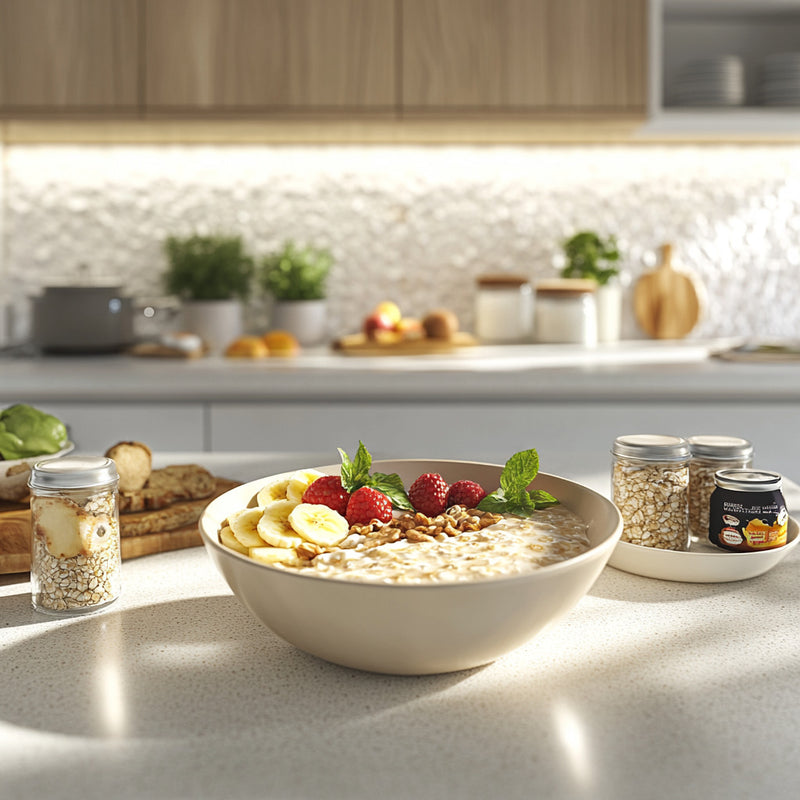
The Difference Between Quick Cook Oats and Instant Oats: A Complete Breakdown
Oats are a breakfast staple for their versatility, fiber content, and ability to form the base of both sweet and savory dishes. While you may casually choose between different types of oats in the grocery aisle, you might not be fully aware of the distinctions between Quick Cook Oats and Instant Oats. Here’s a complete guide to help you understand the differences and pick the best option for your needs.
1. Processing Differences
Both quick cook oats and instant oats undergo processing to reduce cooking time, but the key difference lies in how they are processed:
-
Quick Cook Oats:
- They are rolled oats that are steamed and flattened slightly thinner than regular rolled oats.
- They require minimal cooking time, usually about one minute on the stovetop or in the microwave.
- Unlike instant oats, they do not come pre-cooked.
-
Instant Oats:
- Instant oats are rolled even thinner than quick oats and are pre-cooked, which makes them faster to prepare.
- All you need to do is add hot water or milk.
- They are softer in texture once cooked, largely because of their thinness and pre-cooking process.
2. Nutritional Value
According to Quaker Oats, there is no nutritional difference between quick cook oats and instant oats. Both provide the same essential nutrients like fiber, protein, vitamins, and minerals that oats are known for.
The choice between the two primarily comes down to texture preferences and convenience rather than health benefits.
3. Flavor and Toppings
-
Instant Oats:
- They are often sold in individual packets and pre-flavored, such as apple cinnamon, maple brown sugar, or cinnamon spice.
- These packets may also include added ingredients like sugar, fiber fortifications, or protein.
- Ideal if you’re short on time and prefer a ready-to-eat option.
- Downsides? Less control over your sugar and flavor levels if you like to customize.
-
Quick Cook Oats:
- These oats come plain, meaning you’ll need to add flavorings, toppings, and sweeteners yourself.
- While this might take a little more effort, it’s a benefit for those who prefer to experiment with unique or creative combinations such as bananas, peanut butter, nuts, or savory ingredients like kimchi and spinach.
- Versatile for recipes beyond breakfast (e.g., baking or savory dishes).
4. Convenience and Cooking Speed
For busy mornings or hectic schedules, the speed of preparation is often a deciding factor:
-
Quick Cook Oats:
- Cook in about 1 minute on the stovetop or in the microwave.
-
Instant Oats:
- Ready almost instantly—just pour hot water or microwave for a few seconds.
The additional flavor packet convenience of instant oats adds another layer of time-saving for those rushing out the door.
5. Personal Preference: A Matter of Control
If you enjoy crafting your oatmeal toppings and controlling sugar levels or ingredients, quick cook oats are the better choice. If you prefer grab-and-go options with minimal preparation time, instant oats offer convenience at the expense of flavor customization.
Final Takeaway
Instant oats are an excellent option for those who want a fast, pre-flavored breakfast with minimal effort, whereas quick cook oats are perfect if you enjoy flexibility and creativity in your oatmeal routine.
Food writer Stella Totino, a passionate fan of versatile oatmeal meals, recommends sticking with quick cook oats if you like to customize flavors. However, instant oats are a handy backup for mornings when time is of the essence.
Choose the one that fits your lifestyle best—and enjoy a hearty and wholesome start to your day!




